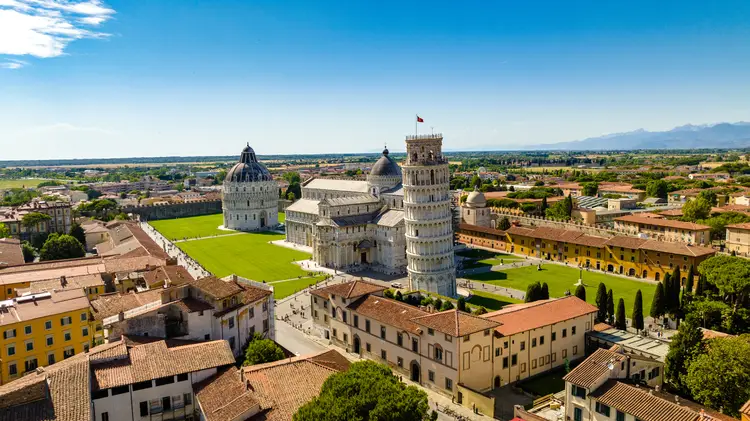A couple can live comfortably in Pisa on a budget of about $2,000 per month. Remember that this is a university city, so prices for many things—
accommodation, restaurant meals, entrance fees, etc.—are aimed at that demographic. Retirees should find Pisa easy on their pockets.
One budget item that stands out as more expensive is the cost of utilities, which can run from $100 to $300 per month. There are a few reasons for this—
limited local energy generation, taxation and fees (Italy tacks extras like TV tax onto your electric bill), and seasonal demand. Electricity costs go up significantly during winter months.
Pisa has four seasons, with cool winters (around 38°F or 3°C from December to February) and hot summers (around 85°F or 29°C from June to August). It gets most of its rainfall in summer and autumn. Snow is rare.
Italy’s health care system is one of the world’s best, so you should feel confident having your medical needs taken care of here. In Pisa, public health care facilities are available through the Servizio Sanitario Nazionale (SSN). This is the national health care system, which provides affordable and comprehensive care to residents.
Cisanello Hospital and Santa Chiara Hospital are public hospitals that provide specialized care and emergency care. You can also find private facilities in Pisa if you need faster appointments. Facilities in Pisa are modern and well-equipped, and medical professionals are highly trained.
Pisa offers a fairly wide selection of outdoor recreation opportunities. The city is mostly flat, making it ideal for cycling, and trails slice through the surrounding countryside.
Pisa is only a 20-minute drive to the coast of the Tyrrhenian Sea and several beaches where you can sunbathe, swim, or do water sports. In town, you find gyms, parks, and facilities for tennis, soccer, and other sports. Nearby in Tirrenia, there’s an 18-hole golf course set against picturesque Tuscan scenery.
The Arno River flows through Pisa and provides opportunities for boat rides and water sports like kayaking and canoeing.
In town, there are several museums where you can take in the region’s history and culture. You can view classical works of art at the Museo Nazionale di San Matteo or contemporary ones at the SMS Centro Espositivo.
There’s a lively performing arts scene hosted at famous venues like Teatro Verdi, an opera house that hosts opera, ballet, and classical music performances, as well as small theaters and cultural centers.
Pisa hosts festivals throughout the year, such as Luminara di San Ranieri in June, which lights up the Arno River with thousands of candles. It also hosts regattas, book festivals, and other unique events.
Italians are friendly, welcoming people, and they’ll do their best to accommodate you in English… but you should plan to learn Italian to better integrate into the community and make day-to-day life easier.
Italy offers an independent means visa known as the Elective Residency Visa that many retirees use to live in the country long-term.
The basic requirement to qualify is proof of passive income (pensions, dividends, royalties, rents, etc.) of 32,000 euros per year (about $33,765 annually or $2,815 monthly). This grants you a one-year residence permit that is renewable.
Sincerely,

Sophia Titley
Editor, Overseas Living Letter

